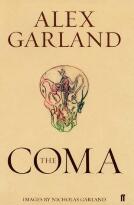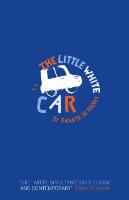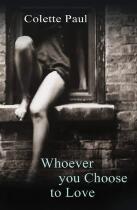3 Book Reviews
by anna battista
The Coma by Alex Garland (Faber & Faber)
 It must be very difficult for a writer to find a gripping plot and develop it in a thrilling way and with a unique style. Alex Garland did well with his first novel The Beach (Penguin Books), and with his second work, The Tesseract (Penguin Books, 2000). He then took a break from prose and wrote the screenplay for the film 28 Days Later (2002), directed by Danny Boyle (who also directed the film of The Beach), but has now gone back to the world of novels. With his third book, The Coma, though, Garland has travelled far away from the land of backpackers, he's indeed concentrated on exploring states of semi-consciousness.
It must be very difficult for a writer to find a gripping plot and develop it in a thrilling way and with a unique style. Alex Garland did well with his first novel The Beach (Penguin Books), and with his second work, The Tesseract (Penguin Books, 2000). He then took a break from prose and wrote the screenplay for the film 28 Days Later (2002), directed by Danny Boyle (who also directed the film of The Beach), but has now gone back to the world of novels. With his third book, The Coma, though, Garland has travelled far away from the land of backpackers, he's indeed concentrated on exploring states of semi-consciousness.
The drama at the core of The Coma (Faber & Faber) starts after a young man, Carl, is assaulted on the underground by a group of thugs and beaten unconscious. The protagonist of the story thinks he has woken up, but he's actually still in a coma and moves between the reality and a confused and visionary state of unconsciousness. When he realises what is happening, Carl will have to find a way to wake himself up, trying to remember the house he lived in when he was a child, the faces of his parents, the voice of the woman he loves or a song he heard years before.
The style of the story is very good and retains something of Kazuo Ishiguro's The Unconsoled. Even the theme of the coma, used thousands of times in contemporary literature (in the last few years also in Iain Banks' The Bridge and Irvine Welsh's Marabou Stork Nightmares) and films, is treated in an original way. Yet the plot of The Coma is quite thin and is not helped by the forty (horrendous) woodcuts included in the book, courtesy of Nicholas Garland, the author's father and Daily Telegraph cartoonist. Indeed, the woodcuts try to imitate cartoons, minimal art and Japanese prints with very poor results.
To get the best of the novel, read it in one sitting (it's quite a short book), but remember to skip the woodcuts, some of them will be particularly offensive for many art lovers.
The Little White Car by Danuta de Rhodes (Canongate)
 She was born in Paris, studied in London, then moved to New York to work in the fashion industry. She's written only one novel, but she's already the French literary sensation of the year. Her name is Danuta de Rhodes and her first fatigue is The Little White Car (Canongate).
She was born in Paris, studied in London, then moved to New York to work in the fashion industry. She's written only one novel, but she's already the French literary sensation of the year. Her name is Danuta de Rhodes and her first fatigue is The Little White Car (Canongate).
Set in Paris, the story revolves around a young woman, Veronique, who wakes up one morning after a night fuelled by alcohol and weed, with the strange memory of a bad car accident. After sobering up, Veronique remembers her white Fiat Uno having an accident in a tunnel with a big dark car and, while watching the news, she connects the event with the death of Princess Diana. Realising she's just killed the princess, she launches with a few friends in a deranged plan to dismember the car and drop it piece by piece in various bins around Paris. The plan must be carried out before her parents come back from their holidays and before the whole Paris finds out about her. Colourful characters will surround Veronique, helping her with her plan or simply driving her crazy, from her placid and huge St Bernard to her useless ex-boyfriend Jean-Pierre who discovers he's got a talent for writing terrifically cheesy but successful songs, his Uncle Thierry, whose only reason for living is his passion for pigeons, her best mate Estelle and the nosy Françoise, Veronique's workmate, a woman with the worst clothes in France.
Implausible, yet entertaining, The Little White Car, is the right book to read while on holiday, if you simply want to have something funny to read or if you like the works of another author, Dan Rhodes, who might actually be hiding behind the name Danuta de Rhodes.
Whoever You Choose To Love by Colette Paul (Weidenfeld & Nicolson)
 There are just a bunch of writers who have penned as their first work a flawless collection of stories. This happens not for lack of talent, but because writing short stories is a difficult art. It means to be able to condense in just a few pages what could be diluted in a whole book. It is for this reason that Colette Paul's anthology Whoever You Choose To Love (Weidenfeld & Nicolson) comes as a wonderful surprise.
There are just a bunch of writers who have penned as their first work a flawless collection of stories. This happens not for lack of talent, but because writing short stories is a difficult art. It means to be able to condense in just a few pages what could be diluted in a whole book. It is for this reason that Colette Paul's anthology Whoever You Choose To Love (Weidenfeld & Nicolson) comes as a wonderful surprise.
Born in Glasgow in 1979, Paul recently graduated from a Creative Writing course at the University of Glasgow. Most of the 12 stories here collected are based in her hometown, in particular in the Southside, around Govanhill and Queen's Park, yet they could be based anywhere else in the world. The stories are indeed epiphanies, little windows on the lives of a few characters who are simply trying to get by.
The anthology explores the states of mind of various characters: a daughter remembers her first encounter with her estranged father after hearing he's dead ("We Are Broken Things"); a woman introduces her ill daughter to her new boyfriend during a date ("Here, This Tragedy"); a girl discovers that love is confusing and disappointing ("Oh Tell Me The Truth About Love!"); a mother abandons her family in search of a new life ("Renaissance").
Some of these stories are melancholic, others sad, funny or witty, but all of them are extraordinary stories about ordinary characters, all are well written and beautifully built, with an alternation of descriptive parts, dialogues and free direct and indirect speech.
Whoever You Choose To Love is a work about the mutability of the human heart and marks the arrival of a major new voice in Scottish literature.
Copyright (c) 2005 erasing clouds |
|